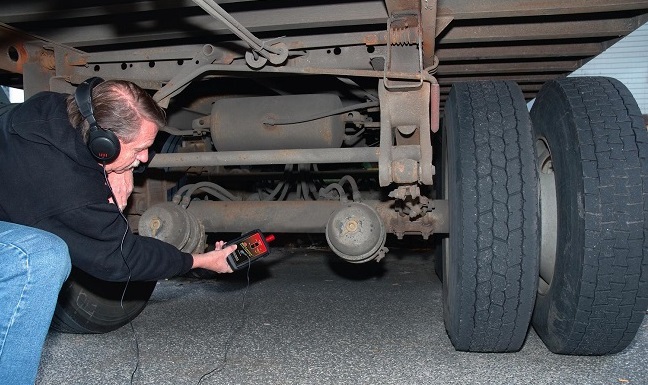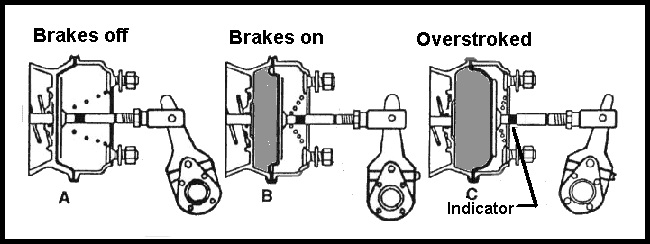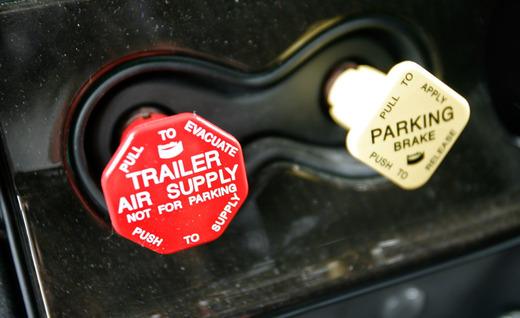The Air Brake System In Trucks
In earning your Class A license, one of the first terms you may hear is regarding the air brakes or the brake functions within a truck. It's certainly a term that belongs to beginners in the industry, but it is not a topic that anyone moves past in their professional trucking career – knowing about this topic is vital to success in one's trucking job.
Understanding this primary function of a commercial vehicle will establish a firm foundation in one's ability to better understand the world of trucking, but perhaps more importantly, the other important and essential basics that an occupation in commercial driving might entail, especially when preparing for a search into potential jobs.
Understanding this concept may seem somewhat daunting for someone outside of the trucking realm, but with a basic understanding of the mechanics of trucks, it will be a topic one can understand in no time. More importantly, one will be able to understand the value of comprehending trucking-related terms and how that may relate to a future truck driving job.

What is An Air Brake?
Simply put,
an air brake refers to the mechanism used within a heavy-duty vehicle in order to make it stop, a system that is required due to the weight of the vehicle in question. Unlike hydraulic brakes which are used for a non-commercial vehicle, air brakes use compressed air to push upon a piston that applies pressure to the brake pad, allowing it to stop the vehicle.
Commercial trucks are not the only vehicles that use this particular system, as many buses, trailers and railroad cars also use them in order to safely and securely come to a stop.
Many mechanics and truckers alike champion the air brake due to the fact that they believe it to be a superior mechanism, considering that air is an unlimited resource and there is no room to run out of any type of operating fluid.
Air brakes are also incredibly effective in many manners, as they must be in order to ensure safety on the road and prevent any accidents that may be caused by the time it may take to brake.
Why Do Drivers Need To Know About This?
Some beginning drivers may be curious as to why they need to have any amount of knowledge about the technical side of trucker jobs when they will simply be operating the truck itself.
One of the main reasons a driver needs to be well-versed in this subject is because for air brakes to operate properly and efficiently, one must know how to maintain them properly so that they function well. While air brakes are designed well, if they are not cared for they will not accomplish the job correctly. Just as one should perform regular and routine maintenance for the entirety of their vehicle, care of brakes should certainly not be overlooked.
Secondly, the demonstrated knowledge of this subject is paramount in the cdl air brake test, a mandatory exam for those beginning the journey of receiving their Class A license. Mastering this important subject will not only grant a prospective driver a great starting point in which to broaden their breadth of knowledge, but it will also give them some valuable perspective into the vehicle they will be operating over the course of their career.

Air Brakes and Driver Safety
Learning about this subject isn't simply a formality, it's also the introduction into a driver's overall comprehension of safety in the industry. A major part of preparing for any sort of driver examination will be one's sufficient understanding of diligent operation in the trucking industry, and certainly proper braking techniques are part of the driver safety 101 curriculum.
This knowledge is meant to let a driver understand the totality of their responsibility behind the wheel and the capabilities (as well as the limitations) of a commercial truck on the road. When a commercial truck operator has knowledge about the innerworkings of their vehicle, its not meant to stuff their head full of facts or quiz them unnecessarily, it's to help hold them accountable for the hi-end piece of machinery they will be operating.
From this perspective, drivers can then build their knowledge from the ground up (quite literally) and go on to examine other parts and particular aspects of the truck that may contribute to overall road safety and road awareness. It's not imperative to know every working detail of one's rig, but being able to comprehend a vital detail of the materials one is working with can only help a driver and those around them.
Testing Your Knowledge
When it comes down to it, drivers need to have knowledge about air brakes for the cdl test that asks their knowledge on this subject. Future drivers are required to have some working knowledge on the mechanical makeup of the truck, and should be prepared to answer questions regarding them.
In order to pass the examination, a driver-to-be may be asked questions that pertain to the technical aspects of air brakes (for example, PSI levels) as well as questions about the basic make-up of a brake system in a truck.
With some studying, it's more than possible to ace this quiz without even having to consult a mechanic beforehand.
Multiple resources exist on the web and in person that help an individual become well-informed and well-versed in their field. One should not worry about the content going over their head or becoming too specific, many educational outlets have the necessary information laid out in an informative and easy-to-comprehend manner.
Don't become discouraged about consuming all of the content needed to pass, many drivers with no prior knowledge of trucks have done so and have received their CDL with flying colors.
What Else Can I Expect To Learn In The Future?
Depending on where a driver's career path takes them or what company they may be employed with, a myriad of extensive knowledge across various trucking subjects will be expected of them.
Air brakes are only the tip of the iceberg – one may have the opportunity to learn all about tractor-trailer combinations, road regulations, and the correct way to haul certain freight. Some suggest that drivers never truly stop learning as long as they are on the road, as one's trucking skills continually develop over the years and the nature of the industry sees changes as well.
Specific knowledge about brakes is certainly an important topic to tackle, but just as important is a driver's personal development and the knowledge about their own specific driving experience and growth behind the wheel.
Certain companies will place more emphasis on drilling rules of the road into their truckers, others may be more focused on ensuring that their drivers know what is happening under the hood so that they may diagnose any problems that arise in their truck. Owner-Operators, on the other hand, may develop a specific expertise in finding loads for themselves and shed the other areas of focus in trucking knowledge altogether.
In short, there is no one path that drivers take in the sense of personal and professional growth. This provides for a diverse and highly-skilled group of drivers on the road and makes the roadways in our country more safe as well as the industry more efficient.

Where Can I Learn More About This Subject?
The best place to receive more knowledge about this topic certainly i
s online or through a state DMV pamphlet, but there are other ways in which a driver can educate themselves.
Consider reaching out to a technical school nearby or a certified driver training program in your area. You may not be able to sit in on a lecture for free, but these schools may be privy to additional materials or reading that provide more insight to the subject of air brakes.
For the intrepid learner, head on over to a truck stop and strike up a conversation with a driver. Let them know that you are in the process of studying for your commercial driver's license and that you would like to ask them a few questions if they have the time. A particularly benevolent trucker may even take you over to their rig and let you make an inspection for yourself. Getting hands-on experience and being able to physically see a truck may help with the overall comprehension of the topic.
Don't be afraid to ask questions or to consult multiple sources in order to get a firm grasp on the subject. It's better to "over-ask" questions than it is to be modest and shy away from learning more.
Be excited about your path as a trucker! Once this topic is mastered, one can learn nearly anything there is to know in their field.
Take the free CDL practice test
Similar types of questions that will be on the actual DMV exam
Get started
